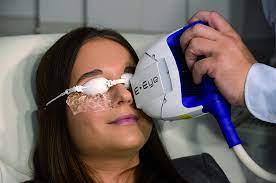Diabetic retinopathy treatment London. If you are looking for a private Diabetic Retinopathy Doctor you need to know about a new technology available that is changing the options available for diabetic eye disease sufferers.
What are the four stages of diabetic retinopathy?
- Background Diabetic Retinopathy : Microscopic leaks of blood are visible on the back of your eyes. Your vision is unaffected
- Pre-proliferative Diabetic Retinopathy : leaking of blood in the retina becomes widespread in the form of larger haemorrhages and exudates. Your vision may not be affected but there is a high risk it could become affected.
- Proliferative Diabetic Retinopathy : Bleeding is widespread, news blood vessels are growing uncontrollably around the retina which leak further, scarring begins to appear and there is a potential of retinal detachment. There is a high chance of loosing your vision.
- Diabetic Macular Oedema : Fluid from the blood can leak into the macular area at any stage of diabetic retinopathy.
Do all diabetics get retinopathy?
It may take several years before diabetic retinopathy may affect your sight. Over a thousand cases of blindness caused by diabetic retinopathy are reported by the NHS annually in England.
How can you tell if diabetes is affecting your eyes?
Unfortunately, it is not possible to tell if diabetes is affecting your eyes unless the disease reaches the later stages or there is swelling in the central vision. It is through regular checks using fundus photography that diabetic retinopathy can be picked up and monitored. In the UK, this is normally through the diabetic eye screening programme. If changes are found that could be damaging to your vision, you are then referred to a Diabetic Retinopathy Consultant in a hospital eye department. In London, this could be Moorfields Eye Hospital, The Western Eye Hospital for example.
Can diabetic retinopathy go away?
The signs of retinopathy do not go away by themselves. Blood sugar control is paramount in keeping diabetic retinopathy controlled. Keeping your diabetes under control can help it from getting worse.
Can diabetic eye damage be reversed?
Researchers are looking into ways of reversing diabetic retinopathy . Currently there is a cold light therapy called Noctura400 that has been shown to reverse diabetic retinopathy and macular oedema.
What is the best treatment for diabetic retinopathy?
There are a number of treatment options available. These would be discussed with you by your Diabetic Retinopathy Consultant or their team.
- Focal Laser treatment
- Pan retinal photo-coagulation
- Injections with anti-VEGF – Injections are used to treat diabetic macular oedema
- Vitrectomy – To remove the vitreous gel and scar tissue
- Noctura400 Therapy – Non-invasive therapy using a registered medical device that treats and reverses diabetic retinopathy and diabetic macular oedema.
Does my Diabetic Retinopathy Doctor know about Noctura 400 therapy?
As a new therapy, which is not widely available on the NHS, your Diabetic Retinopathy Doctor may or may not know about this therapy option. We encourage our patients to share this information with their eye care team and give a letter about the therapy for you to give to your Diabetic Eye Doctor.




